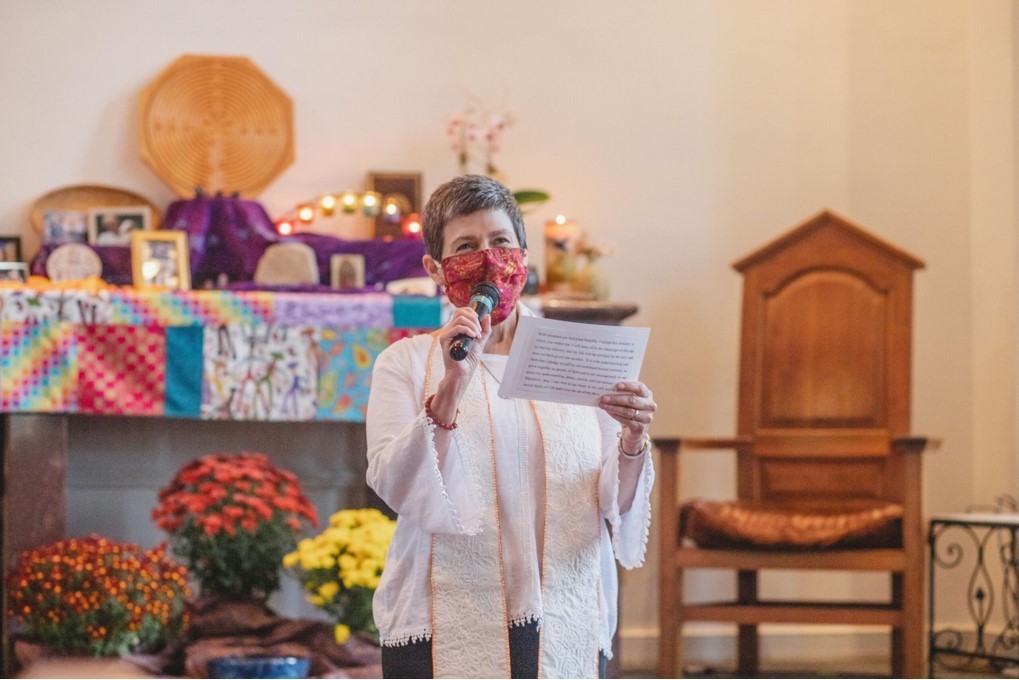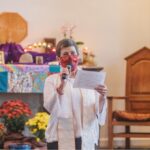
I invite you to imagine a time in your own life when you were willing and strong. A time when you felt ready and you had fortitude to do something you did not think you could do…
As you ponder this, does something arise for you immediately—or is your mind totally blank? I’ve been thinking about this myself for a while and I invite you to reflect more fully with yourself in the coming week. When in your life have you been willing and strong? It is a powerful question and leads to another question, where in your life would you like or are you being called to be willing and strong?
I want to be sure to name that everyone’s willingness or ways of being strong don’t necessarily look the same. And we ourselves aren’t always strong in the same ways all the time. You may have heard the Ian Maclaren saying, “Be kind, for everyone you meet is fighting a hard battle.” I have found this saying to be true and helpful to remember. What is easy for one of us may be excruciatingly difficult for another and for reasons that we may never know. It is helpful to remember that it is not our place to judge what being strong means or looks like for others.
The question is, what does it look like when we imagine ourselves as willing and strong? This doesn’t mean we can’t be inspired by the actions of others. We’ve been graced by many examples of willingness and strength in our lifetimes. We are surrounded by inspiring stories of each other’s willingness and strength. These stories, as Rev. Linda has said, are the sacred texts of our lives.
Our musical prayer in last Sunday’s Community Worship service, Holly Near’s “I am Willing,” has been a touchstone for me since the first time I heard it in 2006. It is from her album “Show Up”—a fitting title for a long-time peace activist who has modeled showing up time and time again. Showing up certainly is a way to embody one’s willingness and strength. To me, the lyrics are a prayer speaking directly to my soul.
The video of Rev. Linda and her daughter Katie singing was made for my ordination last fall. I am grateful to Linda and Katie for their beautiful recording and so happy to share it with you again.
The song says, “I am open and I am willing.” I believe these words connect deeply to our lived Unitarian Universalist theology. This lyric invites us to imagine ourselves open, willing and strong.
As UUs, part of our theological grounding is that we aspire to be open minded—we say this every week as part of our chalice lighting—and to engage in an ongoing search for truth and meaning in our lives. To that end, we must embrace the important task of lifelong learning.
As UUs, faith development across the lifespan: children, youth and adults is one of our core values. We say, it is our work throughout our lifetimes to keep learning, growing, reflecting, wondering and experiencing new perspectives and deeper understandings. This work allows us to change—to transform because of our own continued unfolding. The willingness to engage in ongoing learning and personal change is part of what is needed for our mutual liberation. And nothing less than our mutual liberation will save us. Let me say that again, our willingness to engage in ongoing learning and personal change is part of what is needed for our mutual liberation. Our faith calls us to work for our mutual liberation. It is fundamental to who we are.
It has been said by many throughout history, “None of us are free until all of us are free.” The line of Holly Near’s song, “to be hopeless would seem so strange it dishonors those who go before us, so lift me up to the light of change” speaks to the strength of spiritual fortitude needed to keep on doing the work of building the world we dream of. You and me, we are part of a lineage of those who have worked for, some even giving their lives for, freedom and justice and we are called to carry on their legacy with our own choices and behaviors.
Our UU theology calls us to action, willingly. It calls us to use our gifts and our privilege and put our faith into action. We can do this by living our faith out loud —the big and little things—we do every day.
How, you may ask? In every way imaginable… but today I want to return to those same threads we’ve been using to weave our narrative arc this month and by tapping into the creative power of our collective imaginations. We can be willing and use our strength: 1) to create, nurture, and heal our relationships in our personal lives, in our congregation and in our country, 2) to commit to making listening deeply a spiritual practice and 3) to continue to build our capacity for empathy while using the power of love to help shape the world we dream of and, 4) we can keep learning, growing and changing.
Please know that I am not saying this work is quick or easy—remember that spiritual fortitude is part of this. And there are things we do and ways we behave as individuals and as a body that cause us to get in our own way—but that’s another sermon for another time. The take-away today is that our UU faith calls us to be open, willing and strong—to be willing to grow and change, to live in ways that work for our mutual liberation, to risk failure yet be willing to get up and begin again in love. Our UU faith calls us to keep becoming and to imagine and discover and live in ways that make us feel most fully alive.
So remember so spend some time this week recalling in your own life when you have been willing and strong. I know you have and I know you are. Each of us is so much stronger than we even know, acknowledge or imagine to ourselves to be. After you name for yourself where in your life you have shown up, for yourself or for others as willing and strong, then imagine where in your life you would like or are being called to be willing and strong now.
Here’s one example from me. I know I am now called to be an ever more active participant in our nation’s democracy. I know that I took our democracy for granted in the past and I won’t let myself do that again.
Finally, I want to remind us of other truths and that is that we can do hard things and we do not have to do them alone. We do not do this work alone. The threads we’ve been weaving together in our sermons each week this month remind us of this truth. Our salvation is found in our relationships, in our connections, in our ever-widening circle of community and in the everlasting power of love. Our collective imagination gives us courage and fuels our strength. And, with the help of music, poetry, stories, laughter, nature and so much more, we will rise together, imagining ourselves as willing and strong and ready to say, “yes!” to life as it calls us on.
Amen and blessed be.
Rev. Leia

